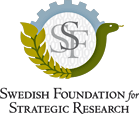Matrix Pencil Computations in
Computer-Aided Control System Design:
Theory, Algorithms and Software Tools
In this research program funded by the Swedish Foundation for Strategic Research (SSF), we develop theory, algorithms and software tools for matrix pencil computations in Computer-Aided Control System Design (CACSD). This includes new and improved algorithms and software for computing subspaces and canonical structure information and for solving important matrix equations, as well as theory and software tools for handling complicated nearness problems. The problems considered are motivated by our collaboration within the thematic network NICONET (for numerics in control and systems theory).
We consider descriptor (or generalized state-space) systems,
which, e.g., arise from modelling interconnected systems
(electrical
circuits)
and mechanical systems (multi-body
contact problems).
Computing
staircase forms of the associated system pencil using orthogonal transformations
most reliably solves important ill-posed computational problems encountered
in the analysis and synthesis of descriptor systems. Examples include computation
of system poles at infinity with their multiplicity, solution of non-standard
Riccati equations, computation of rational inverses, and minimal descriptor
realization (observability/controllability
forms).
We develop robust algorithms for computing canonical structures (Jordan,
Kronecker, Brunovsky) of matrix pencils. In several CACSD applications it
is important to know which are the nearby canonical structures that
explain the qualitative behavior of the system under small perturbations.
Our algorithms and software tools will be delivering such information
(qualitative as well as quantitative) based on the combinatorial
relationships among the various Jordan and Kronecker structures known as
strata. Building on our earlier and more recent contributions regarding
algorithms, software, applications and mathematical theory, we now aim at
solving these problems for both dense and sparse matrices and matrix
pencils, including small to medium-sized problems as well as large-scale
problems.
For
large-scale systems, the problems that we address are fundamental in
model reduction applications.
We also develop algorithms for challenging problems in the design and analysis of periodic systems, including the computation of periodic invariant subspaces with specified spectra, the Kronecker structure of high-dimensional structured matrix pencils, cycling products and quotient products of square or rectangular matrices, and the solution of various periodic matrix equations. Moreover, we develop algorithms for problems relating to indefinite inner product spaces using hyperbolic transformations.. Such problems appear in several signal processing and control applications.
An integral part is to develop theory, algorithms and software for computing reliable error bounds based on new perturbation results and condition estimators.. Finally, in this project we develop state-of-the-art library software and tools for high-performance computing systems.
Team members
Some ongoing projects and publications by project
Publications and Theses from 2002-
Publication list from 2002 - 2009 (pdf version)
 |
 |
 |